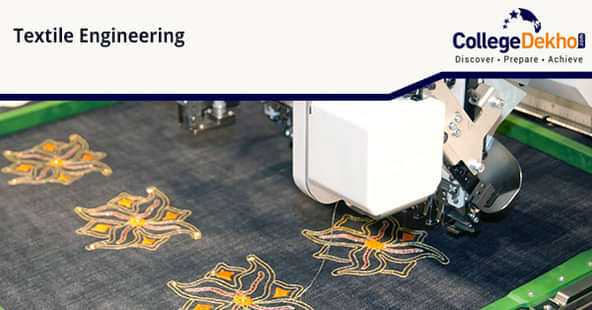Textile Engineering is in growing demand and has set a trend in the education sector all over the world. Check out all about Textile Engineering in India - Eligibility, Admission Process, Fees, Scope, and more.
- Textile Engineering Eligibility Criteria 2020
- Textile Engineering Course Duration and Fee Structure 2020
- Textile Engineering Admission Process 2020
- Top Textile Engineering Colleges in India 2020
- Textile Engineering Programmes 2020
- Scope of Textile Engineering in India 2020:
- Job Profiles for Textile Engineers 2020:
- Salary Package for Textile Engineers 2020:

Textile engineering is one of the most sought-after courses not only in India but all across the world. It makes use of science in all the activities and methods in the process of manufacturing textile fabrics and yarns. The field revolves around colour, garment and fabric line of industries.
Textile engineering is one of the most popular disciplines in engineering. It is based on control and design of fibre, products and machinery and textile and apparel process. The field included law, scientific techniques, principles which help in developing and manufacturing textile fabrics and different types of yarns. Textile Engineering also deals with the principles that examine the polymers associated with the creation of textile fibre.
The textile sector plays a key role in the growth of the economy of India. Chiefly, the Indian textile sector can be divided into the handloom and mechanized sector.
Textile Engineering Eligibility Criteria 2020
Let us now check out the eligibility criteria for Diploma, Undergraduate and Postgraduate level programmes in Textile Engineering 2020:
Diploma: For Diploma, a candidate should have cleared 10+2 in Science stream (with Physics, Mathematics and Chemistry). Certain minimum marks (around 50% aggregate marks) could be part of the criteria in few institutes.
Bachelor’s:
In order to get into UG level Textile Engineering, an applicant should have passed 10+2 with Biology, Mathematics and Chemistry.
For IITs exclusively, it is mandatory to have passed in the
Joint Entrance Examinations JEE
.
Master’s: In order to pursue a PG level Textile Engineering course, a candidate should have a bachelor’s degree in Engineering or equivalent engineering branches. The duration of a
PhD: PhD can be pursued after the completion of a Master's in Textile Engineering.
Textile Engineering Course Duration and Fee Structure 2020
The table below lists the respective duration of the course along with their estimated fee structures:
Level of Programme | Duration (years) | Fee Structure (Approx.) |
|---|---|---|
Diploma | 3 | 20,000 - 1,50,000 |
Bachelor’s | 4 | 30,000 - 1,50,000 |
Master’s | 2 | 18,000 - 2,50,000 |
PhD | 1-2 | 20,000 - 1,50,000 |
Note- The course fee is subjected to change without any prior notice.
Textile Engineering Admission Process 2020
Here are the engineering admission processes for all the important textile engineering courses in India:
Diploma: The admission process depends on the institute. Few are based on merit while few follow direct admission process.
Bachelor’s: Institutes providing B.E/ B.Tech courses mostly follow merit-based admission process. Marks scored in relevant entrance tests like JEE, Institute-based, state-wise, etc. are taken into account. Applicants can also utilise NRI or donation quota, if eligible. This differs from institution to institution.
Master’s: The main entrance for admission to Master's is the Graduate Aptitude Test in Engineering (GATE) . Eligible applicants should pass the required entrance exam followed by a round of group discussion. Lastly, they must qualify further rounds of Personal Interview.
Also Read: Best Engineering Courses in India - Scope, Salary and Colleges
Top Textile Engineering Colleges in India 2020
Below-mentioned is the top 15 Textile Engineering Colleges in India 2020 with different programmes:
- Govt. College of Engineering & Textile Technology in Serampore (GCETTS)
- Indian Institute of Technology in Delhi (IIT)
- Institute of Chemical Technology in Mumbai (ICT)
- Dr BR Ambedkar National Institute of Technology in Jalandhar (NITJ)
- Giani Zail Singh Punjab Technical University Campus in Bathinda (GZS PTU)
- Shri Vaishnav Vidyapeeth Vishwavidyalaya in Indore
- Manikya Lal Verma Textile and Engineering College in Bhilwara
- Anna University in Chennai
- Rajasthan Technical University
- LD College of Engineering in Ahmedabad
- Kumaraguru College of Technology in Coimbatore
- University of Calcutta’s Department of Jute and Fibre Technology
- Uttar Pradesh Textile Technology Institute (UPTTI)
- PSG College of Technology in Coimbatore (PSGCT)
- Osmania University in Hyderabad
Textile Engineering Programmes 2020
Explore the list of the courses available in Textile Engineering for the next academic cycle:
- Bachelor of Engineering in Textile Technology
- Bachelor of Technology in ManMade Fiber Technology
- Bachelor of Technology in Textile Chemistry
- Bachelor of Technology in Textile Technology
- Bachelor of Technology in Textile and Carpet Technology
- Bachelor of Engineering in Textile Technology
- Diploma in Fabrication Technology & Erection Engineering
- Diploma in Textile Technology/Textile Engineering
- Master of Engineering in Textile
- Master of Technology in Textile Technology
- Master of Technology in Textile Chemistry
Scope of Textile Engineering in India 2020:
Textiles are seen everywhere be it clothes, bed sheets, draperies, carpeting, upholstery fabrics or towels. Textile Engineering is the science used for the production of all these things.
Textile Engineering expands and designs the equipment, methods and processes which produce fine fabrics, yarns and fibres. And, textile which incorporates bed sheets, carpeting, towels, fabrics, clothes, and more can be found everywhere. That’s the expanse of this field, that can never slump at least in the coming future.
How can any generation be devoid of fashion anyway? We are all fascinated by the kind of fashion that comes and goes by after a certain period of time. Even the medical sector can’t do away with textile, which includes bandages, hospital gowns, dialysis machines, etc.
Trained textile engineers are in demand by the biggest textile plants and companies in India. There is certainly in dire need for better textile and process in the mechanised sector where uniforms and weather-resistant materials come into the picture.
Also Read: Engineering Courses Available after Class 12
Job Profiles for Textile Engineers 2020:
Now, have a look at the different job profiles that one can choose from after completion of a course in Textile Engineering:
- Operation/Management Trainee
- Quality Control Supervisor
- Medical Textile Engineer
- Process Improvement Engineer
- Production Engineer
Salary Package for Textile Engineers 2020:
Salary for any job profile depends on the years of experience one has. Out of several factors, few that depend on salary are skills, grades, aptitude and employee profile. Generally, fresh graduates can earn around Rs 15-30k per month. A textile engineer with around 3 years of experience can expect more than Rs 50k per month.
To get more updates about Textile Engineering in India, stay tuned to CollegeDekho.
















Similar Articles
GATE EE MCQ, MSQ and NAT Questions
List of Top 25 Government and Private Engineering Colleges for M.Tech Admission through GATE 2025
List of NIT Colleges Accepting GATE 2025 Score 500-600
KCET 2025 Syllabus: Check Subject Wise, Download PDF
KCET 2025 Exam Dates (April 18 to 19)
KCET 2025: Exam Dates (April 18 to 19), Syllabus, Eligibility, Exam Pattern